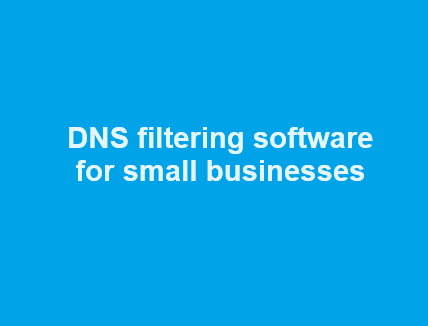
Small businesses need cybersecurity measures to protect their corporate network against various online threats, such as phishing attacks or malicious domains. They store a considerable amount of client data and get involved in online transactions, so they also have much to safeguard. What they don’t have is the enormous budget of large enterprises to invest in cybersecurity.
This is where DNS filtering comes into play. In recent years, DNS filtering capabilities have become accessible for all sizes of businesses. They can now control internet traffic with a powerful tool and enforce their own filtering policies. In this article, we will further explain this technology and try to help you understand why every small business should prioritize DNS filtering in 2023.
What is DNS Filtering?
You need to understand the concept of the Domain Name System (DNS) to fully acknowledge how DNS filtering works. This system is the backbone of web traffic as it translates IP addresses to a more human-friendly version: website URLs. All websites on the internet have a unique IP address for you to type in and visit the website. But it would be impossible to remember the IP addresses of all the websites you use, so the Domain Name System turns them into user-friendly URLs such as www.facebook.com. It then translates it to the relevant IP address, so the server understands and routes you to the website.
DNS filtering technology uses blacklists of malicious websites to protect users from unwanted online platforms, adult content, or other harmful sites. While it sounds very technical, DNS filtering only uses domain names or website categories to understand whether something is allowed or not. So small businesses can create their own DNS filtering policies to decide how their tool blocks access.
DNS filtering can also be used to prevent employees from accessing inappropriate content during work hours and maintain network performance by blocking bandwidth-draining websites. All these policies can be enforced to a user’s device with a DNS filtering tool, and businesses can prevent web-based threats.
The Rise of Cyber Threats in 2023
In 2023, we’ve seen a drastic surge in the number and complexity of cyber attacks, both for small and large businesses operating online. From malware attacks to phishing attacks, there are a lot of different types of online threats targeting online businesses, and they need to do something about it. Let’s see some of the most pressing cyberattacks in 2023.
Ransomware Resurgence
Ransomware attacks, which involve cybercriminals encrypting a victim’s data and demanding a ransom for its release, have been on the rise. In 2023, we anticipate that this trend will continue to surge, targeting businesses of all sizes. Small businesses are often preferred targets due to their perceived vulnerability.
Advanced Persistent Threats (APTs)
APTs are highly skilled and focused attacks that infiltrate networks covertly and repeatedly. SMEs should be cautious not to get caught in these attacks, as they are becoming more widespread. APTs can cripple a corporate network, and this would be detrimental to a small business with limited resources.
Phishing Attacks
Phishing attacks aim to access business resources through stolen credentials or malicious software downloaded by employees. The attackers use social engineering techniques such as replicating a legitimate organization and sending an email as an internal partner within a company. The users sometimes believe these malicious emails or websites and provide their credentials, resulting in stolen data.
Supply Chain Vulnerabilities
The interconnectedness of today’s global economy means that supply chain attacks pose a significant risk. Cybercriminals can infiltrate businesses through vulnerable supply chain partners, and the fallout can be extensive.
DNS Filtering: An Essential Layer in Cybersecurity
As cyber threats are becoming more dangerous, small businesses should create a multi-layered security system that includes detailed reporting, protection against dangerous websites, and tools for restricting access within their organization. DNS filtering software for small businesses is one of the pillars in such a system to prevent internet threats through content filtering capabilities.
Preventing Access to Malicious Sites
By intercepting a DNS query and blocking requests to known harmful websites, DNS filtering serves as a gatekeeper. By doing this, it prevents users from visiting websites that are well-known to contain malware, phishing, or other online dangers. This real-time filtering contributes to the security and safety of your network.
Content Filtering
Beyond security, DNS blocking can also let businesses control internet access during work hours. They can include certain website categories in their policies, such as gambling platforms or adult content websites, to ensure that the employees are focused on their job instead of spending their day on time-wasting sites.
Bandwidth Management
Even if businesses don’t want to interfere with how their employees use the Internet, they do have limited bandwidth. This means that if a user is visiting bandwidth-wasting websites, other activities will be affected. DNS filtering can be used to prevent access to such websites and ensure low latency.
Phishing Protection
Phishing assaults are among the most common types of online risks. By identifying and blocking well-known phishing domains, DNS filtering lowers the possibility that staff members fall for shady emails or websites.
The Cost of Ignoring DNS Protection
Neglecting DNS protection can prove to be a costly oversight for businesses. While the potential threats are evolving, the consequences of inadequate protection can extend beyond financial burdens. Falling victim to a cyberattack can have devastating financial implications. Ransomware attacks, data breaches, and other malicious activities can result in direct financial losses due to ransom payments, regulatory fines, and legal fees. Moreover, a security breach can tear apart a business’s reputation. Customer trust is hard-earned but easily broken, and a breach can lead to a loss of customers and damage to the brand’s image.
Non-compliance with data protection regulations can result in hefty fines. Overlooking the protection of customer data can lead to legal action, not to mention the resources required for mitigation. Addressing security incidents, recovering data, and rebuilding network infrastructure requires considerable resources. Small businesses may not have the resources to manage a full-scale data breach effectively. In an age where data security is a key differentiator, failing to protect your data can lead to a loss of competitive advantage. Clients and partners may prefer to work with businesses that demonstrate robust security measures instead of you.
The Additional Advantages of DNS Filtering
DNS filtering provides more benefits than simply defense against online threats. It is an appealing option for small enterprises because it offers numerous other advantages. First off, preventing access to websites unrelated to work increases efficiency by minimizing distractions during working hours. DNS filtering further improves network speed by blocking bandwidth-draining websites, guaranteeing a more seamless online experience for business purposes.
Furthermore, these solutions are usually simple to implement and maintain, making them available to companies with few IT resources. Additionally, they provide scalability, expanding to meet your business’s demands and growing with it while maintaining a high level of safety.
Choosing the Right DNS Filtering Solution for Your Business
Selecting the appropriate DNS filtering solution for your business is a critical decision, as it can significantly impact your cybersecurity and network performance. Key considerations include scalability, ease of use, customization, reliability, cost-effectiveness, and support. Ensuring the solution can grow with your business, offers a user-friendly interface, and allows for customization will help tailor it to your unique requirements. Choose a reliable provider with a track record of uptime and consider cost-effectiveness while weighing the level of customer support and the frequency of updates to maintain ongoing security and assistance.
Implementing DNS Filtering: Steps and Best Practices for SMBs
Implementing a DNS filtering solution is relatively simple, as long as you follow a few basic steps. Here are the essential steps and best practices for SMBs to follow when deploying their DNS security.
Assessment: Begin with a thorough assessment of your network’s needs and potential vulnerabilities.
Choose the Right Solution: Select a DNS filtering solution that aligns with your business requirements.
Customization: Tailor filtering rules to match your specific needs, balancing security and productivity.
Testing: Conduct thorough testing to ensure the system works as intended before full deployment.
Training: Educate your team about the new security measures and the importance of responsible internet use.
Monitoring and Updates: Continuously monitor the system, apply updates, and adapt to evolving threats and needs.


















